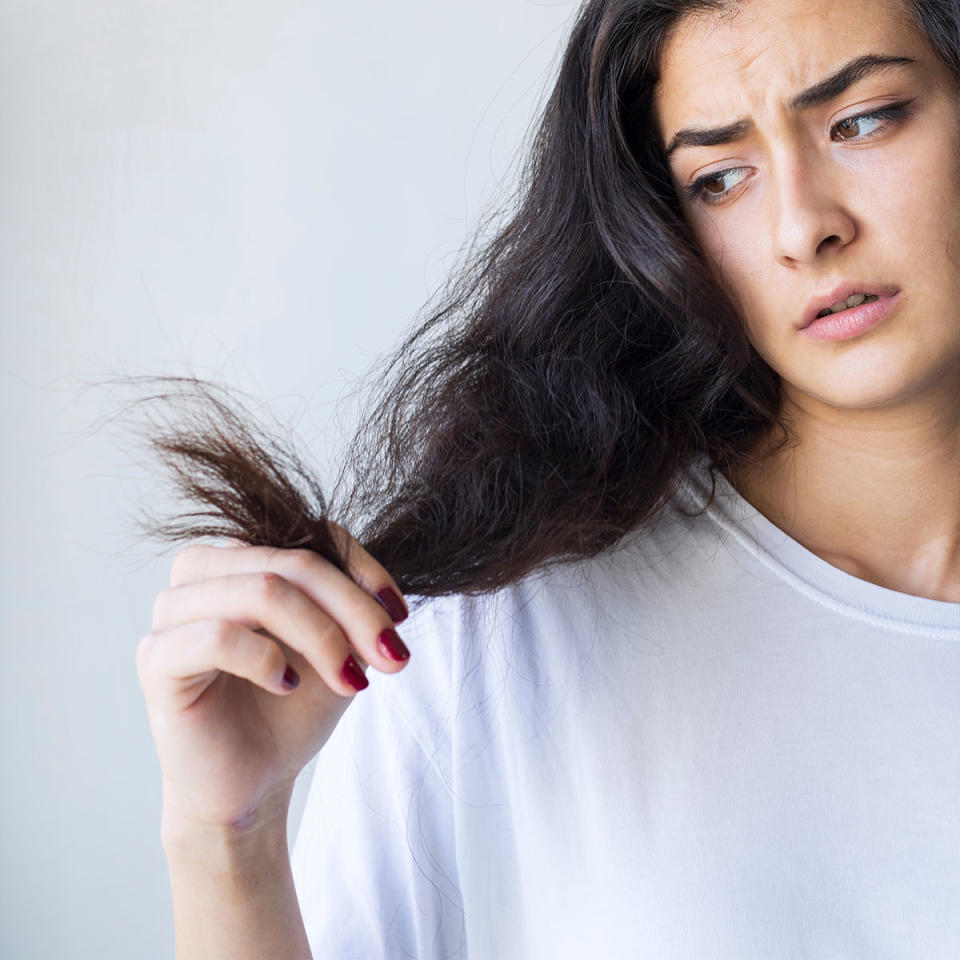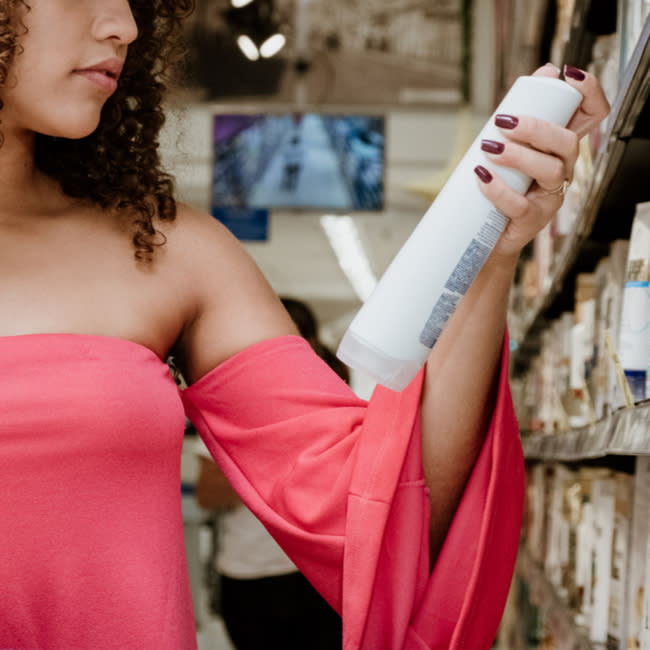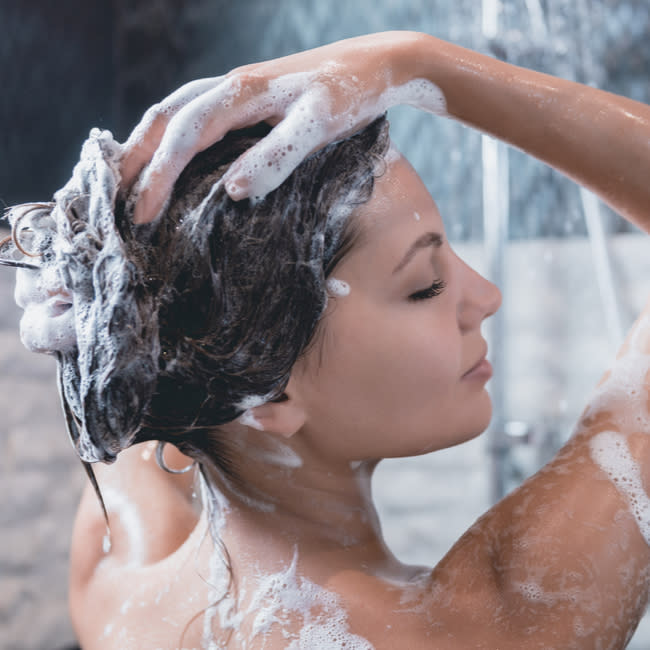Experts Say Women With Thinning Hair Should Avoid These Products At All Costs

This article has been updated since it was originally published to include more expert insight.
Hair loss and thinning can be caused by the natural effects of aging, the ways and (tight styles) we might wear our hair, stress and an unhealthy diet. If you’re experiencing hair fallout, it is vital to visit your dermatologist for personalized suggestions and treatments, but in the meantime, knowing what common shampoo ingredients and kinds of products might exacerbate these conditions could be helpful to keep in mind.
We checked in with hair experts to learn more. Read on for hair health tips from Dr. Daniel Boyer, M.D. of Farr Institute, Dr. Enrizza P. Factor, M.D., clinical dermatologist and researcher, Lauren Holland, professional hairstylist at Headspace Hair Artistry, Allyson Carter, professional hairstylist and Editor-in-Chief at Hair Spies and Lauren Udoh, professional hair stylist and Hair Creative Director of WigReports.

1. Thickening Shampoos
You might think, if you have thinning hair, that a logical solution would be to choose a 'thickening' product, but Boyer explains that this is far from the case. "Long-term use of this shampoo may clog the pores of your scalp, interfering with the oxygen supply in the skin," Boyer says.
"As a result," he continues, "inflammation may occur more often, leading to hair loss due to damage caused to your skin." Instead, he suggests using shampoo products that are low in comedogenic oils that "don't clog your skin pores," like a thickening shampoo would.
Carter agrees and notes that her "rule of thumb" regarding haircare is that "if a shampoo is too soapy, the color looks fake, or smells way too good; then it probably isn’t too good for your scalp." Thickeners, she says, are what give shampoo that nice lathery texture. "Some widely used thickeners are sodium chloride and polyethylene glycol, which are highly irritating for the scalp and strip hair of all its moisture, making it dry and brittle," Carter says.
Fragrances like diethanolamine and triethanolamine "completely destroy the keratin in hair and contribute to drying and loss of hair," she adds. Shampoos marketed as ‘thickening’ can also be dangerous, she points out, when used in excess as they can clog pores. "The clogged pores prevent oxygen from reaching the scalp, which in turn leads to irritation and hair loss."

2. Sulfate-Based Products
One ingredient that Udoh deems vital to avoid for thinning or weaker strands is sodium lauryl sulfates (often abbreviated as SLS). “This harsh detergent, sodium lauryl sulfate, is a common ingredient in shampoos and conditioners and is known to strip away natural oils, leaving hair feeling dry, brittle, and damaged,” she says.
This ingredient can “also cause scalp irritation and hair loss.” Sulfates, she adds, can be very damaging to color-treated hair as well, and they should be avoided if at all possible. Udoh suggests looking for hair products that are labeled as "sulfate-free" or "no sulfates."
These, she notes, will be much gentler on your hair and will help to protect your color. "Sulfates are harsh detergents that can strip hair of its color and natural oils, leaving it dry, brittle, and prone to breakage," she continues. "They are often found in shampoos, conditioners and other hair products, so it's important to read the labels carefully and avoid those that contain sulfates."
There are many sulfate-free conditioners on the market these days, she says, so there's "no need to sacrifice your hair's health in order to keep it clean and shiny."

3. Shampoos Containing Alcohol
Alcohol is another shampoo ingredient you'll want to avoid if you already have fine or delicate hair, Carter expains. "Alcohol is generally very harsh on hair and strips away the majority of moisture on the scalp," she says.
"In the ingredient list, alcohol is sneakily disguised with ingredients like ‘propanol’ or ‘ethanol’ that the general public doesn’t recognize as being alcohol," she continues. These ingredients, she notes, "majorly contribute" to frizziness and breakag, so she encourages to "watch out for those sneaky '-ols.'"

Tips To Better Benefit Thinning Hair
When it comes to hair products for thinning hair, experts stress that you really should use products recommended by your dermatologist, but learning more about ingredients that do aid thinning hair can still help you in the long run. There are small changes and choices you can make to make sure you have a healthier scalp and hair, Holland says. She suggests "opting for a sulfate free shampoo," as these are "widely available and are less irritating and harsh" on your scalp and hair. "Take it up a level and look for something more natural," she says.
Holland also notes that minimizing damage to your hair is possible by reducing heated tools and chemical services and protecting your hair while swimming and wearing a hat while in the sun to protect your scalp. "Give your scalp a break between washes. Your natural oils are produced for a reason, so give them a chance to their job," Holland continues. She also advises to "avoid using styling products such as gels, waxes, hairsprays and dry shampoos on a regular basis," as these will cause build up as they settle on your scalp and clog hair follicles. "Once a hair follicle is damaged, there is no reversal unfortunately," she says.

Factor, a dermatologist says that your "best option for finding the real cause" of hair loss is connecting with a dermatologist. "Above all, you need to know what’s causing your hair loss before you can take steps to remedy it," she says. Factor shares that she thinks about most shampoos like a "car wash." "You're only treating the exterior—the scalp. The root cause of the hair loss happens under the hood, under the scalp. So if you're suffering from genetic hair loss, shampoos are not the magic bullet," she says.
Factor identifies the following causes related to hair loss that are crucial to be aware of: hereditary causes, hormonal changes, illness and other medical concerns, certain medications, nutritional deficiencies, tight hairstyles, hot tools and chemical treatments. Ultimately, it's important to know how imperative a visit with your dermatologist is if you're experiencing hair loss, but knowing to avoid 'thickening' shampoo products can be helpful to remember as well!

